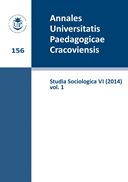Sekularyzacja i prawomocność Nowoczesności
Secularization and legitimacy of the Modern Age
Author(s): Andrii BaumeisterSubject(s): Social Sciences, Sociology, Theology and Religion
Published by: Wydawnictwo Uniwersytetu Komisji Edukacji Narodowej w Krakowie
Keywords: secularization; modernity; Charles Taylor; Hans Blumenberg; Jan Assmann
Summary/Abstract: The article discusses the concepts of the secularization of Hans Blumenberg (Legitimacy of the Modern Age) and Charles Taylor (A Secular Age). According to Blumenberg, the Modern Age is not a secular transformation of the initially religious contents. It dismisses the accusations of the Modern Age in illegitimacy. When Blumenberg tells this story of the emergence of the Modern Age, he tries to create an image of revolutionary change in the understanding of the world and human beings. This story of the Modern Age told by Blumenberg, is supported by the recently (2003) published book of the German Egyptologist Jan Assmann: The Mosaic Distinction or The Price of Monotheism. According to Assmann, the birth of monotheism is accompanied by the emergence and development of religious intolerance: there appears the idea of the true religion which opposes itself to false superstitions. Assmann calls this radical opposition and differentiation the “Mosaic Distinction”. This distinction, on the one hand, creates an insuperable distance between a transcendent God and the world, and, on the other hand, gives theological (transcendent) justification to the fundamental principles of human practices. Assmann tries to prove the secular origin of the idea of justice and law. In this sense, the secularization of the Modern Age has to be understood as a quite legitimate process, as a manifestation of the negative potential, inherent in monotheism. In this context I want to suggest in this article two important arguments: (1) Assmann’s and Blumenberg’s stories could be fruitfully confronted with the history of secularization as stated in the book A Secular Age by Professor Taylor. Secularization should not be described as a necessary process (the theory of subtraction Entzauberung, rationalization etc.); (2) After an identification of the one-sidedness of Blumenberg’s and Assmann’s narratives, I want to return to the question of the legitimacy of the Modern Age. I select two examples: the concept of the personality (its absolute and universal validity) and the concept of human rights. My position is to show that the validity of these concepts cannot be proved in terms of immanent legitimation. This shows the limitations of secular rationality and is a good argument in order to realize the importance of religion and faith in contemporary practical and philosophical discussions.
Journal: Annales Universitatis Paedagogicae Cracoviensis. Studia Sociologica
- Issue Year: VI/2014
- Issue No: 1
- Page Range: 28-38
- Page Count: 11
- Language: Polish

